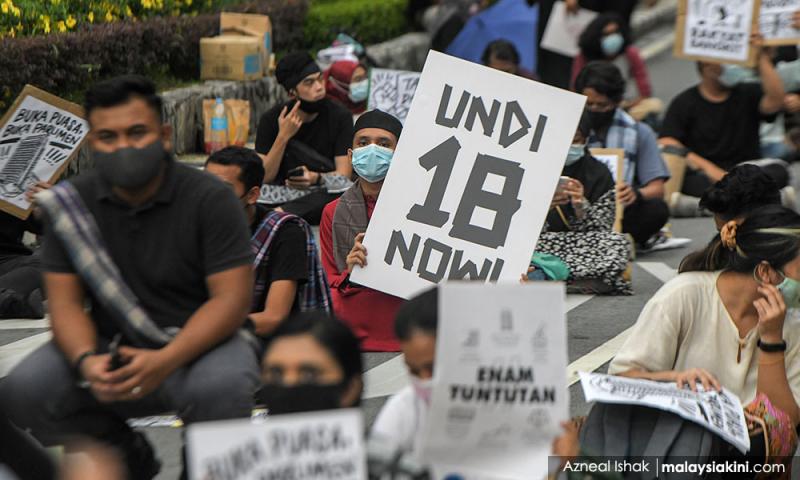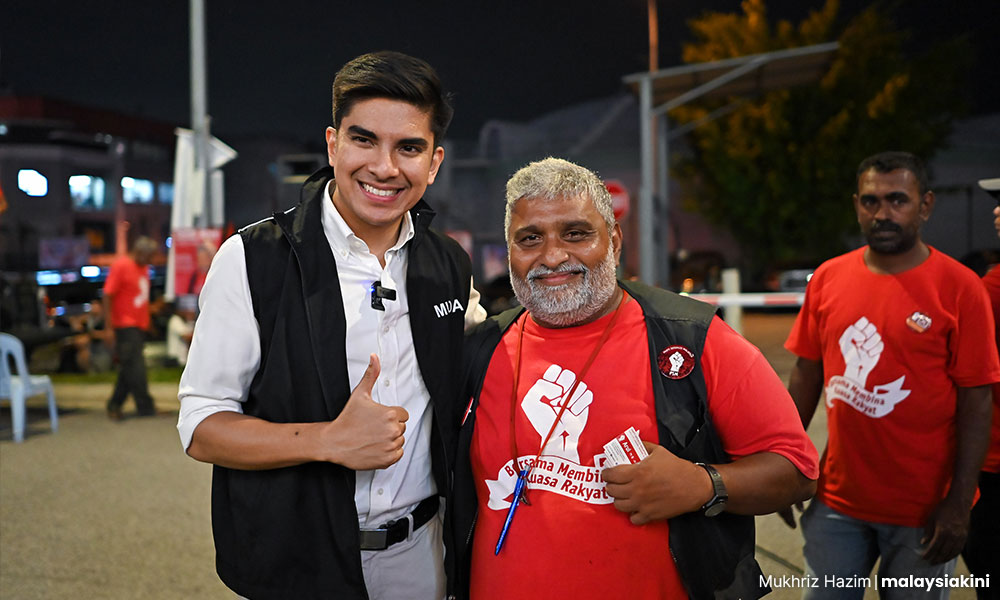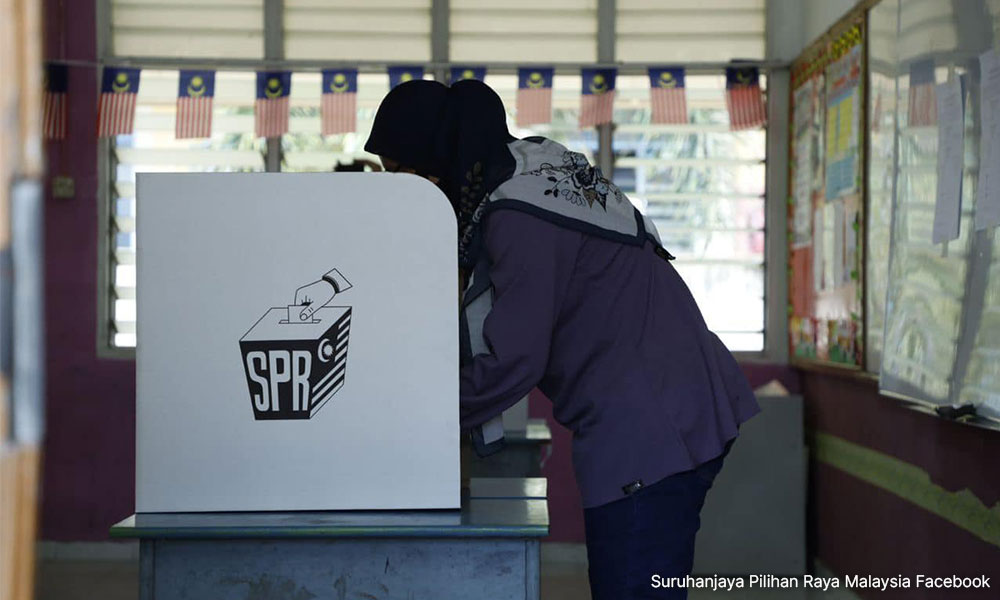
Mariam Mokhtar
COMMENT | Who is more powerful? An 18-year-old or an MP like the youthful Syed Saddiq Syed Abdul Rahman?
The teenager of course!
The 18-year-old, like most boys his age, is probably a charming young man, who is polite to you, although he does appear clueless some of the time.
He learns life’s lessons from TikTok and social media. If he is Malay, his spiritual needs are provided by clerics who make life and decision-making very simple for him.
To be fast-tracked to heaven, just vote PAS or any Malay from Perikatan Nasional. If he is a failure in life, he's told that DAP is responsible.
The teenager is not bogged down unnecessarily by career choices, what to wear, responsibility and nation-building. He has absolute faith in the cleric, only because he is ignorant and does not know his religion.
As an individual, the 18-year-old wields no power, but as a collective, he and his peers can influence others, because they may hold the key to the country’s future and determine which path the nation takes.
You may have had nightmares just thinking about a bleak future under a ‘Green Wave’ administration. Despite the stellar efforts of Prime Minister Anwar Ibrahim whilst campaigning, Pakatan Harapan failed to impress. You were outraged by the results, and rightly so.
Blaming game
Many of you strongly believed that most of the 18-year-olds had voted for the wrong reasons in the recent state elections and held them responsible for Harapan’s abysmal showing.
As a scapegoat had to be found, the blame fell on the 18-year-olds, Syed Saddiq, and Muda.
Incredibly, Parti Sosialis Malaysia (PSM) became the rakyat’s fourth punching bag, because some Malaysians understood “socialist”, to mean “communist”. Both PSM and Muda were then accused of sabotaging Harapan.
Post-election, clips of smirking young adults taunting others with “I wore Harapan’s red t-shirt, took their money, but I still voted for PAS/PN” were circulated.
Enraged Malaysians now want Undi18 reversed.
COMMENT | Who is more powerful? An 18-year-old or an MP like the youthful Syed Saddiq Syed Abdul Rahman?
The teenager of course!
The 18-year-old, like most boys his age, is probably a charming young man, who is polite to you, although he does appear clueless some of the time.
He learns life’s lessons from TikTok and social media. If he is Malay, his spiritual needs are provided by clerics who make life and decision-making very simple for him.
To be fast-tracked to heaven, just vote PAS or any Malay from Perikatan Nasional. If he is a failure in life, he's told that DAP is responsible.
The teenager is not bogged down unnecessarily by career choices, what to wear, responsibility and nation-building. He has absolute faith in the cleric, only because he is ignorant and does not know his religion.
As an individual, the 18-year-old wields no power, but as a collective, he and his peers can influence others, because they may hold the key to the country’s future and determine which path the nation takes.
You may have had nightmares just thinking about a bleak future under a ‘Green Wave’ administration. Despite the stellar efforts of Prime Minister Anwar Ibrahim whilst campaigning, Pakatan Harapan failed to impress. You were outraged by the results, and rightly so.
Blaming game
Many of you strongly believed that most of the 18-year-olds had voted for the wrong reasons in the recent state elections and held them responsible for Harapan’s abysmal showing.
As a scapegoat had to be found, the blame fell on the 18-year-olds, Syed Saddiq, and Muda.
Incredibly, Parti Sosialis Malaysia (PSM) became the rakyat’s fourth punching bag, because some Malaysians understood “socialist”, to mean “communist”. Both PSM and Muda were then accused of sabotaging Harapan.
Post-election, clips of smirking young adults taunting others with “I wore Harapan’s red t-shirt, took their money, but I still voted for PAS/PN” were circulated.
Enraged Malaysians now want Undi18 reversed.

Muda president Syed Saddiq Syed Abdul Rahman and PSM deputy chairperson S Arutchelvan
Why blame the teenager? He is the product of our education system. Our schools failed him.
Blame parental upbringing because some parents failed to set boundaries and teach their children values or the difference between right and wrong. Many children became feral.
Blame the selfish politicians who decided that bog-standard education would suffice. Our schools failed to teach critical thinking and discuss the world beyond the tempurung (coconut shell).
More importantly, discussions about how politics affect our lives are discouraged, presumably because a thinking young adult will reduce the term of a corrupt and power-hungry politician. Supporters are urged to remain blindly loyal to the politician, in exchange for unlimited handouts. Embracing change is discouraged because the politician could lose power and control.
Blame our academics. Our lecturers only care about their rice bowls. Discussing democracy whilst remaining neutral, is tricky. Why rock the boat and produce socially and politically aware young adults? It is far simpler to lead a quiet life, become a professor, and on retirement from public service, get a plum job in the industry as a consultant.
Blame the clerics for failing to be good role models in nation-building. Too much hard work is involved in building bridges between people of different faiths and cultures. Lazy clerics will procrastinate with, “God will punish in the afterlife.”
Voting age
All these adults ignored the consequences of their inaction.
Ours is a country where leaders can do no wrong, whose supporters idolise them and they are rarely blamed for their poor leadership.
Outraged by Harapan’s failure, some Malaysians have advocated a return to the former voting age of 21. They want the Madani government to act now whilst it still commands a majority in Parliament.
They believe that raising the voting age will stop divisive politics, tribalism, racism and extremism; but will reversing the Undi18 move solve the problem? Why treat the symptoms of a disease rather than find a cure?
Reducing the voting age to 18 was first mooted by Lim Kit Siang in 1971, but he failed to get any traction. Malaysia was a different country then. Adults were more responsible, teenagers had values and integration between the different races was strong. Umno probably suspected that lowering the voting age would be disastrous for them.
Why blame the teenager? He is the product of our education system. Our schools failed him.
Blame parental upbringing because some parents failed to set boundaries and teach their children values or the difference between right and wrong. Many children became feral.
Blame the selfish politicians who decided that bog-standard education would suffice. Our schools failed to teach critical thinking and discuss the world beyond the tempurung (coconut shell).
More importantly, discussions about how politics affect our lives are discouraged, presumably because a thinking young adult will reduce the term of a corrupt and power-hungry politician. Supporters are urged to remain blindly loyal to the politician, in exchange for unlimited handouts. Embracing change is discouraged because the politician could lose power and control.
Blame our academics. Our lecturers only care about their rice bowls. Discussing democracy whilst remaining neutral, is tricky. Why rock the boat and produce socially and politically aware young adults? It is far simpler to lead a quiet life, become a professor, and on retirement from public service, get a plum job in the industry as a consultant.
Blame the clerics for failing to be good role models in nation-building. Too much hard work is involved in building bridges between people of different faiths and cultures. Lazy clerics will procrastinate with, “God will punish in the afterlife.”
Voting age
All these adults ignored the consequences of their inaction.
Ours is a country where leaders can do no wrong, whose supporters idolise them and they are rarely blamed for their poor leadership.
Outraged by Harapan’s failure, some Malaysians have advocated a return to the former voting age of 21. They want the Madani government to act now whilst it still commands a majority in Parliament.
They believe that raising the voting age will stop divisive politics, tribalism, racism and extremism; but will reversing the Undi18 move solve the problem? Why treat the symptoms of a disease rather than find a cure?
Reducing the voting age to 18 was first mooted by Lim Kit Siang in 1971, but he failed to get any traction. Malaysia was a different country then. Adults were more responsible, teenagers had values and integration between the different races was strong. Umno probably suspected that lowering the voting age would be disastrous for them.

Syed Saddiq picked up the mantle in 2019, and he is right to want our “youth to have more say in policy matters, nation-building and be empowered to make more responsible decisions"; but by then, the political and social landscape had changed.
In the apartheid system of our own making, molly-coddled Malay youths, who are used to hand-outs, with their strong sense of entitlement, know little about the challenges their non-Malay peers face.
When Syed Saddiq lobbied for the Undi18 bill, did the other MPs think that most Malaysian 18-year-olds were like him?
The young and inexperienced Syed Saddiq is articulate, opinionated, and unafraid to hold controversial views.
Outside Parliament, the average 18-year-old is nothing like Syed Saddiq and is probably reticent about speaking up. It is not that he does not want to tell you, more likely that he knows so little of life, to offer an opinion.
A reversal of Undi18 will be strongly opposed by PN.
The solution lies in Education Minister Fadhlina Sidek to revamp the education system and for Anwar to aggressively implement reforms to uplift the rakyat socio-economically and to re-emphasise the importance of voting. Think long-term.
MARIAM MOKHTAR is a defender of the truth, the admiral-general of the Green Bean Army, and the president of the Perak Liberation Organisation (PLO). Blog, Twitter.

No comments:
Post a Comment